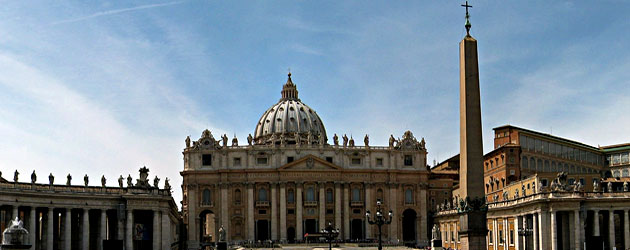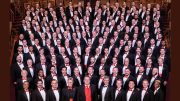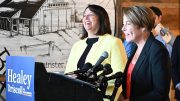 By: Chuck Colbert/TRT Reporter—
By: Chuck Colbert/TRT Reporter—
BOSTON, Mass.—In yet another indication of a changing Catholic Church, the Vatican is asking members of the laity their views on marriage and family life—and a whole lot more.
News of Pope Francis’ wish to hear from the faithful on a variety of topics—including same-sex marriage, contraception, cohabitation, divorce, and remarriage—broke recently in a story in the National Catholic Reporter (NCR). From coast to coast, reaction from LGBT people among the faithful is for the most part positive, but with concerns even as some bishops continued to criticize continuing advances of marriage equality in New Jersey, Hawaii and Illinois.
“First of all I think it is a good thing the Vatican is trying to gather information from the whole church on some of the hot button issues that is tearing the church apart,” said Joe Murray of Chicago’s Rainbow Sash Movement. “This is the first time in my lifetime I have seen such a survey conducted. I see it as another step in beginning the journey of reform in the church. The survey impressed me the most because it appeared to be going over the heads of the local bishops and going directly to God’s people. I am hoping the pope will use the results of this survey as a reason to call for Vatican III council of the world wide church. Such a council would be able to review our doctrinal beliefs in light of new knowledge and lived experience of the Catholic faithful.”
Phil Attey of Washington, D.C., former executive director of Catholics for Equality, agrees.
“This survey says, ‘This is a different church. This is your church,’” Attey said. “And that’s something Catholics in the pews—and, more importantly, those who’ve left the pews—have been longing for.”
In Boston, Charles Martel, who advocated for same-sex marriage as a co-founder of Catholics for Marriage Equality, said, “The Vatican survey of the faithful is extraordinary because it is asking what the people feel, not hearing it only from the filter of the hierarchy: How lives are actually lived in reality and not theory, and the reasons why, will no doubt offer insights in many ways unprecedented. What Pope Francis chooses to do with this information will significantly impact not only his papacy, but for many in the future.” [pullquote]“The Vatican survey of the faithful is extraordinary because it is asking what the people feel, not hearing it only from the filter of the hierarchy: How lives are actually lived in reality and not theory, and the reasons why, will no doubt offer insights in many ways unprecedented. What Pope Francis chooses to do with this information will significantly impact not only his papacy, but for many in the future,” — Charles Martel[/pullquote]
Martel, who worships at St. Ignatius, located on the campus of Boston College in Chestnut Hill, went on to say, “Asking questions about gay persons and the pastoral needs of same-sex couples first of all acknowledges the need to be attentive to these members of the church. Ultimately, the true test of the value of this over time will be whether the church can acknowledge a new understanding about homosexuality, and to remove the pathological approach, which has been central to the teaching up to the present.”
John Kelly, a parishioner at St. Cecilia’s, located in Boston’s Back Bay neighborhood, said, “The survey was incredibly complicated for me, but I got through it.” He added, “My thoughts are that I am lucky to have a priest and church where I feel welcomed.”
Kelly is active in St. Cecilia ministries, including parish council and the Rainbow Ministry, a specific outreach to LGBT people. Still, he said, “From some of the e-mails I’ve gotten, the Catholic Church is not listening to the people. I think priests are afraid to speak out in favor of gay people because their bishops will silence them.”
“I hope Pope Francis will teach them to be respectful for all people and not do exorcisms like the bishop in Illinois,” said Kelly. “That disgusted me. I travel from Quincy to Boston to go to Saint Cecilia’s only because we have a welcoming priest.”
Kelly was referring to the Reverend John J. Unni, the church’s pastor. Several years ago, Father Unni and St. Cecilia’s drew fire from conservative Catholics outraged by the idea of the Rainbow Ministry’s invitation to attend a Mass in celebration of Boston LGBT Pride. [pullquote]New Ways Ministry, along with a dozen progressive Catholic-reform-minded organizations, including DignityUSA, has made the survey accessible on line at www.surveymonkey.com/s/SynodOnFamilyUS.[/pullquote]
Bishops continue anti-gay marriage campaign
Even before Hawaii lawmakers and governor approved same-sex marriage, the local Catholic bishop in Honolulu warned in a letter to the faithful that gay marriage would open the door to incest, polygamy and lead to “juvenile suicides.”
On the same day Governor Pat Quinn signed legislation making same-sex marriages legal in Illinois, the Catholic bishop of Springfield offered prayers of exorcism in Latin during a worship service in opposition to the law. In addition, San Francisco’s Archbishop Salvatore Cordileone, at a recent meeting of the United States Conference of Catholic Bishops (USCCB) on Nov. 11, continued to denounce equal-marriage rights.
“By advancing redefinition, the decisions harmed marriage and harmed our society,” Cordileone told the annual gathering of prelates, going on to say that court decisions [and legislative actions] have produced “negative effects almost immediately,” according to a LifeSiteNews.com report, posted on the archdiocesan Web site.
U.S. bishops’ anti-gay marriage rhetoric remains out of step with Pope Francis’ call to down play contentious social issues and refocus church concerns on human suffering and poverty, emphasizing compassion.
“I like the idea of consulting the faithful,” said Jesuit priest, the Reverend Thomas J. Reese, a policy analyst for the National Catholic Reporter. “It’s always good for the clergy to listen to the people before they do things. All you have to do is look at public opinion polls in the United States and predict what the response is going to be. Most Catholics on gay marriage have no problem with it. On the other hand, there are people who have a problem with [gay marriage]. You’re going to get more responses from the activists opposed to it than the normal Catholic laity.”
Reese went on to say, “But the other part, take gay marriage aside: what’s the pastoral response?” given same-sex marriage is a “reality pastorally for couples and their children.”
That’s a “discussion” needed in the Catholic Church, he said, referring to cases whereupon a clergy member learns of gay parents with school-aged children and then refuses to let them attend parochial schools.
In one sense, Reese said, the handwriting is on the wall.
“There is this tsunami of young people coming,” Reese explained. “They just don’t get the fight over gay marriage.”
For the bishops, he said, they “have already lost” and are going to have to “adapt.”
Based at Santa Clara University in California until the end of this year, Reese is the author of Inside the Vatican: The Politics and Organization of the Catholic Church.
Survey’s origin in Rome
As NCR reported, on October 18 the secretary general of the Vatican’s Synod of Bishops, Archbishop Lorenzo Baldisseri asked various conferences globally to distribute a questionnaire to “deaneries and parishes” to solicit input from “local sources.”
One purpose of the survey is to prepare church leaders for a Vatican-led synod set for October 5 through 19, 2014. Its theme is “Pastoral Challenges of the Family in the Context of Evangelization.”
At first it was not clear how the U.S. Catholic bishops would handle the request for lay input. An initial NCR report suggested that U.S. bishops would provide their own observations, but a subsequent story said the U.S. bishops would follow a “usual process” in soliciting lay input. Already some U.S. dioceses have posted links to the survey on their Websites, including in Iowa, where three of the state’s four dioceses have posted the entire Vatican synod survey online.
In Baltimore, Maryland, Archbishop William E. Lori has provided a direct online link to the survey, seeking input from parishioners.
Boston archdiocese and the survey
Reportedly, Cardinal Seán P. O’Malley of the Boston archdiocese is limiting official survey responses to pastors, church officers and parish council members.
“Bishop Robert Deeley, the Vicar General for the Archdiocese, has sent the preparatory document and questionnaire to pastors for them to discuss with their Parish Pastoral Councils and parish leadership, after which they will [be] collected by mid-December,” reads a an archdiocesan Facebook posting. “If you have any questions about this process, please check with your pastor or ask us here, and we will do our best to answer them.”
When asked for clarification of the archdiocesan approach to the survey, Terry Donilon, archdiocesan secretary of communications, said, “The cardinal has shown it to various councils for input. It will be viewed by the presbyteral council. The archdiocese very much supports the initiative and will of course comply. Dioceses are and will approach it differently but all will get to the same end game, which is to fulfill the wishes of the Vatican for the good of the universal church. No one is looking to control this process but more follow a process of consultation.
Continuing, Donilon said, “In addition, in the Vicar General’s letter he asks pastors to bring it to their parish councils and parish leadership. In essence, to bring it to the parish—the people. Dioceses may approach it in different manners. No one way will be perfect. I believe this is a sound, thoughtful and reasonable approach.”
For his part, Jesuit priest, Reverend Robert F. VerEecke posted a link to the survey in the parish bulletin. St. Cecilia’s Kelly said Father Unni would discuss the survey with the church’s parish council. While the Chicago archdiocese has posted the survey online and invited interested Catholics to participate, respondents must send in a written copy of the questionnaire through the U.S. mail, with a deadline of December 16. Anyone who responds must also give a name, address, and identification by parish, along with a signature. Across the Atlantic Ocean, the Catholic Bishops Conference of England and Wales is seeking countrywide consultation. The conference has invited every diocese, parish, Catholic organization, and individual Catholic to give their input to the conference and synod by responding to the nine sets of topics, spelled out in 39 questions.
LGBT people in ministry see opportunities
“It is important that lay Catholics take part in this consultation process,” said Francis DeBernardo, executive director of New Ways Ministry, which he added, “has been calling for such a process for decades. Now that we have a pope who is willing to listen, it is imperative that Catholics participate by offering their opinions. Who knows more about marriage and family life than lay Catholics who are living out these realities in light of their faith day in and day out?”
New Ways Ministry, along with a dozen progressive Catholic-reform-minded organizations, including DignityUSA, has made the survey accessible on line at www.surveymonkey.com/s/SynodOnFamilyUS.
“There has been a tremendous response,” said Marianne Duddy-Burke, DignityUSA executive director, who also noted a Spanish-language version is available. “It’s a pretty astonishing thing to get a document from the Vatican that asks how many couples in your parish are cohabitating, without civil or religious recognition for their relationships, to what extent do you think people are following church teaching on birth control, what are the pastoral needs of those divorced and remarried, and do same-sex parents ask for pastoral services for their children.”
Overall, “There is a real grounding in reality and a sense of humility and not a place of knowing everything,” Duddy-Burke said, referring to the questionnaire, which is 18 pages and includes 49 questions. Respondents may answer all questions, but are not required to answer all of them. Questions 29 through 37 pertain to marriage equality, same-sex couples, and their children. The deadline is December 15.
Duddy-Burke said once the results have been compiled, they will be sent to Boston’s O’Malley, a consultant to Pope Francis; the Apostolic Nuncio, Bishop Carlo Maria Viganò; Archbishop Joseph E. Kurtz of Louisville, Ky., the newly elected president of the United States Conference of Catholic Bishops (USCCB), and Baldisseri, the upcoming Vatican synod’s secretary general.
And while nobody expects the pope to change church doctrine, dogma, or policy, concerns remain.
“I am not all that hopeful that something will come out of the synod,” said Father Reese, referring to the October 2014 pastoral challenge synod. “Remember, this is not just about responses from the United States” but also “Latin America and Africa.”
In Africa, he noted, government officials and evangelical religious activists “are talking about making [homosexuality] illegal and a crime, arresting people, and executing them.”
Other misgivings
New Ways Ministry’s DeBernardo voiced concerns about the USCCB’s lack of encouragement to distribute questions to local churches. That, he said, “Is an indicator the U.S. hierarchy is unwilling to ask the laity their opinion.”
“I hope the hierarchy will recognize that many faithful Catholics have strong disagreements with church teaching about marriage, family, gender, and sexuality,” said DeBernardo. “I hope, too, that the hierarchy will realize the laity’s disagreements are inspired by their core Catholic faith and values, not by influences from secular society.”
Asked about the LGBT-specific questions, DeBernardo replied, “Less emphasis on the question of same-gender unions” and “more emphasis on the pastoral responses that local churches are making to LGBT people generally.”
“The biggest church problem around LGBT issues is not the expansion of marriage equality,” DeBernardo added. “The biggest church problem is homophobia, particularly among many of the hierarchy and other pastoral leaders, which prevents good outreach from happening,”
DeBernardo said “A good question about the extent of homophobia and how to combat it would have helped.”
© Copyright. Chuck Colbert. All rights reserved.








Dear Francis,
Thank you for a ray of hope that Our Church might again become a bearer of the Good News of Jesus, a church of Love and Compassion.
If your message is to have any impact here in the U.S.A., you may have to install a new leadership, a new set of Bishops, who understand and can live the Servant Leadership demonstrated by Jesus and now by you. (Perhaps eliminate Bishops entirely.)
The Bishops here, programmed to protect the institution and their positions in it, seem not to understand the import and impact of what you preach;
They persist in excluding people, because of beliefs, sexual orientation, gender, marital status, and more, despite Jesus’ call for inclusiveness.
They continue to act as if they are above us all spiritually, training new clerics in that same arrogance, despite Vatican II’s dissolution of the hierarchical pyramid.
They spend huge amounts of donated monies on legal issues (treating the victims of abuse as criminals), church buildings, and political causes, despite the tremendous needs of the poor. And they live a very plush lifestyle.
They are closing large numbers of parish churches all across America for numerous reasons including their inability to recruit celibate males, despite the fact that there are vast numbers of women and married men called to priesthood.
They speak out against abortion, but say little about killing adults with wars, seeming to be not pro-Life, but simply pro-birth.
They may hear your message, but they re-interpret it to suit them, ignore it, and even criticize it. (We doubt you’ll ever get our honest feedback on family you requested.)
So far, your call for Pastoral Bishops has gone unimplemented and because the candidates from which you choose will be the Bishops’ own trained nominees, programmed in high clericalism, we may not live long enough to see a pastoral Bishop in this country. (Those with any sense of Love and Compassion and Servant Leadership, like Thomas Gumbleton, have been ousted from the ranks.)
We welcome your message on the importance of women, but doubt that the Bishops’ Good Ole Boys Club will ever treat them as equals, at least until we all ordain them.
So, Dear Francis, as much as we Love You and Your Message, we’ll believe it when we see it happen here and we seriously doubt it will, given the existing church hierarchy.
With Love and Compassion, John Chuchman